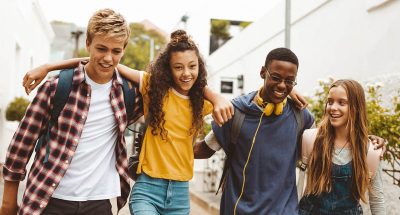
Teaching and Learning for the Greater Good
An online course for educators that puts the science of social-emotional learning and mindfulness into action.

An online course for educators that puts the science of social-emotional learning and mindfulness into action.
Kindness and Cooperation in Schools
School Belonging
Educator Self-Care
Student Well-Being and Positive School Climate
Educators may choose to receive course graduate-level professional development semester units/credits through Courses4Teachers and University of the Pacific. For more information about this option, visit Courses4Teachers and review their process for registration.
Amy L. Eva, Ph.D., is the associate education director at the Greater Good Science Center. During her twelve-year tenure as a teacher educator, she became particularly passionate about educator resilience and self-care, and she loves to conduct workshops that focus on teacher well-being. More about Amy L. Eva.
Vicki Zakrzewski (zahk-shef-skee), Ph.D., is the founding education director of the Greater Good Science Center. As an international thought leader on the science of well-being in education, Vicki writes articles (Greater Good, ASCD’s Educational Leadership, Edutopia, and Huffington Post), gives talks and workshops all over the world, and consults with schools and organizations on how the science of compassion, empathy, gratitude, mindfulness, and other social, emotional, and ethical skills can enhance the professional lives of educators and the lives of their students. More about Vicki Zakrzewski.
Dacher Keltner, Ph.D., is the founding director of the Greater Good Science Center and a professor of psychology at the University of California, Berkeley. He is also the best-selling author of Awe: The New Science of Everyday Wonder and How It Can Transform Your Life, The Power Paradox: How We Gain and Lose Influence, and Born to Be Good, and a co-editor of The Compassionate Instinct. Dacher is the host of the Greater Good Science Center’s award-winning podcast, The Science of Happiness, and is a co-instructor of the GGSC’s popular online course of the same name.
Elena Aguilar, M.A., is the author of five highly acclaimed books: The Art of Coaching (2013), The Art of Coaching Teams (2016), Onward: Cultivating Emotional Resilience in Educators (2018), The Onward Workbook (2018), and Coaching for Equity (August 2020). She is a regular contributor to Edutopia and ASCD’s Educational Leadership, and she was a blogger for EdWeek Teacher for many years. Elena’s expertise derives from twenty-five years as a classroom teacher, instructional coach and leadership coach working in diverse school environments. Elena holds a BA in history and Latin American Studies from the University of California, Santa Cruz, and an MA in Anthropology from the University of California, Berkeley.
Kamilah Drummond-Forrester, M.A., CAGS, is the former director of Open Circle, an action program at the Wellesley Centers for Women that equips elementary schools with evidence-based curriculum and training to improve the school climate and teach children essential social and emotional skills. She is also a facilitator with the National SEED Project, and has led WCW community members in discussions around various topics surrounding equity and diversity.
Meena Srinivasan, M.A., is the executive director of Transformative Educational Leadership, an empowering, racially and culturally diverse, compassion-centered program for educational leaders who are called to integrate mindfulness, social, emotional, academic, and ethical learning into schools and school systems. She is the author of Teach, Breathe, Learn: Mindfulness In and Out of the Classroom and SEL Every Day: Integrating SEL with Instruction in Secondary Classrooms. More about Meena Srinivasan